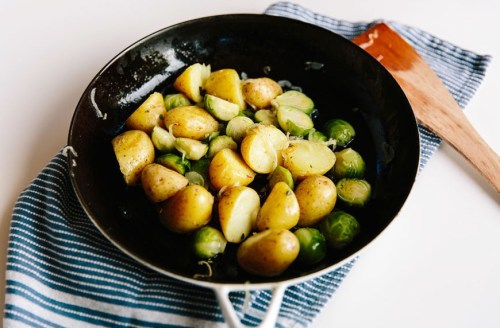Thanks to the ketogenic diet and other low-carb eating plans, potatoes have an even worse rep than Emma Stone’s character in Easy A. (The only exception: sweet potatoes, which have somehow managed to secure a shiny health halo.) But as people increasingly shift away from “meat and potatoes” to “grass-fed beef and cauliflower mash,” spuds are left in the corner looking like a sad sack of…well, you know.
Which begs the question: Are potatoes healthy? And do they deserve their fate as culinary outcasts?
“Potatoes have been vilified over the past few years because they’re high in carbs and they also raise your blood sugar quickly,” says 80 Twenty Nutrition founder Christy Brissette, RD. “So a lot of diets and nutrition experts give the advice to avoid eating white, starchy foods because of that blood sugar surge.”
But despite that, Brissette is not anti-spud. And neither is Tracy Lockwood Beckerman, RD, host of Well+Good’s new video series You vs Food. Here’s why both nutritionists say that the humble potato is a worthy addition to anyone’s diet.
TBH, potatoes have a pretty stellar nutritional profile
Potatoes have it going on in the nutrition department. “Because they’re a vegetable—and not, say, a nutrient-void processed food—they come with a lot of benefits,” Brissette says. Need proof? One large, raw potato also has nine grams of fiber, 1502 mg of potassium (three times as much as what you’d get in a banana!) and 34 mg of vitamin C. “People don’t tend to think of potatoes as vitamin C-rich sources because they’re not citrusy fruits, but they actually are an amazing source,” Brissette says. “You get 45 percent of your daily intake, which is pretty impressive.” Beckerman says you’ll also find magnesium, vitamin B6, phosphorus, niacin, and folate in your everyday white potatoes.
Here’s what you get in one large, white, raw potato, according to the USDA:
- Calories: 255
- Fat: 0.1 g
- Protein: 6 g
- Fiber: 9 g
- Carbohydrates: 58 g
- Sugar: 4 g
No matter the variety of potato, they’re generally pretty good for you
There are several different varieties of what we consider to be potatoes. Beckerman breaks it down:
- White potato: Your classic, standard potato. They’re a root crop, Beckerman says, and are great for frying and mashing.
- Russet potato: Similar to a white potato, Beckerman says, except they’re higher in starch.
- Sweet Potato: They’re a type of tuber, and are packed with vitamin A. And as the name implies, they’re sweeter in taste compared to other forms of potatoes. They’re also high in iron and vitamin C.
- Yams: NOT the same thing as sweet potatoes, Beckerman says! They’re slightly higher in calories and taste less sweet than sweet potatoes, but have more fiber and potassium.
Hold on, but what about the carbs?
Even with these benefits, a lot of people still get caught up on carbs. “One cup of carbs—about the size of your fist—at a meal paired with protein, healthy fat, and vegetables is actually part of a healthy diet,” Brissette maintains. “The problem is when you go to a restaurant and get a baked potato the size of your head or eat a whole plate full of fries because then it’s bigger than the serving size.” Stick to a more moderate serving size of potatoes and you should be good to go.
And yes, potatoes are high on the glycemic index (meaning that it can have a strong impact on blood sugar), but she says that can actually work in your favor, like after a workout. “When you want to refuel, that quick hit of energy can help,” she says. Post-run hashbrowns, anyone?
The healthiest way to cook potatoes
Of course, how you make your potatoes and what you serve them with matters, too. Brissette says the skin is a good source of fiber and potassium, so you’re getting more nutrients if you bake or roast your potatoes, versus peeling them and making mashed potatoes. Beckerman agrees. “The skin is where the fiber and lots of that nutritional goodness of the potato live,” she says. (Just give your spud a good scrub first.)
“Also, if you add a tablespoon of healthy fat—like butter, olive oil, or avocado oil—that will lead to a slower release of the sugar and will help the vitamins be better absorbed,” Brissette says. You should also make sure your plate is balanced with protein and fats, adds Beckerman, to avoid a total carb bomb. (If you need some ideas on how to cook your potatoes, here’s how to eat sweet potatoes for every single meal.)
So, yes, potatoes actually are healthy—as long as they’re eaten in moderation (like, you know, essentially everything else). If you don’t like them, or they don’t fit in with your current eating plan, that’s totally fine. But if you do enjoy a good baked potato with sour cream every now and then, don’t let the haters scare you off.
The article was originally published on December 15, 2018. It was updated on April 2, 2019.
Now that you know where potatoes stand, get the low-down on if rice and olives are healthy.
Sign Up for Our Daily Newsletter
Get all the latest in wellness, trends, food, fitness, beauty, and more delivered right to your inbox.
Got it, you've been added to our email list.











